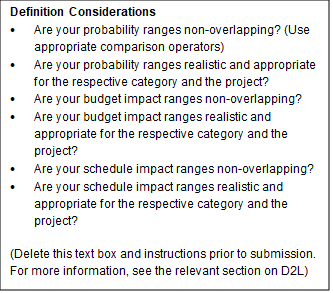Question
MEMO Date: November 19, 2023 To: First Last, Title (Organization) From: First Last, Title (Organization) Subject: Subject Title Attachments: Attachment Name.xxx Risk Management Process The
MEMO
Date: November 19, 2023 To: First Last, Title (Organization) From: First Last, Title (Organization) Subject: Subject Title Attachments: Attachment Name.xxx
Risk Management Process
The project will employ a risk management process which begins with the identification of potential risk which includes financial risks like inaccurate budget forecasts and material costs, external risks such as environmental and logistical challenges, and performance risks involving meeting deadlines and goals for the event execution. Following identification, the next steps involve analysis, assignment, and mitigation of these risks.
All project team members are responsible for identifying risks, and any identified risk should be documented regardless of circumstances. The project manager oversees risk analysis, while the entire team collaborates to prioritize and find solutions.
Furthermore, in the event of potential risks, a collective effort will be made to devise a response plan. To monitor and track these risks, a risk management plan will be established that will include a logbook for recording risks, as well as reports and data related to these risks. This will aid in determining the necessary budget and scheduling adjustments, as well as providing a basis for future risk management and handling unforeseen events during the event. This investment in risk management can yield significant benefits in the long run.
Risk Management Strategies
Risk management strategies not only safeguard against potential losses, but also provide a framework for informed decision-making and proactive planning. This entails a multifaceted approach, including the identification of risks, their evaluation in terms of impact and likelihood, and the adoption of tailored measures to either mitigate, transfer, or accept them as part of the overall risk landscape.
Avoid - this response strategy will result in the removal of specific tasks to eliminate the risk. This may result in a change of scope, cost, or schedule.
Accept - this response strategy will be chosen when there is no other alternative. It means that the risk is acknowledged and should the risk materialize the consequences will be accepted.
Contingency - this response strategy includes developing a secondary (back-up) plan for the risk. The risk will be monitored, and the contingency plan will be implemented should the risk materialize.
Mitigate - this risk response strategy includes reducing either the probability, the impact, or both for the respective risk.
Transfer - this risk response strategy allocates the risk to a different party outside of the project.
Definitions
Probability, impact, and significance are pivotal concepts in the realm of risk assessment and decision-making. These three elements serve as fundamental pillars for evaluating the potential consequences of uncertain events or situations.
Probability
Probability is defined as the likelihood of an event occurring. Each risk is evaluated based on the likelihood of the event occurring as defined in Table 1.
Table 1 Probability Definitions and Ranges
Probability Category | Definition | Probability Range |
Rare | Highly unlikely to occur | |
Unlikely | Will most likely not occur | |
Probable | Possible to occur | |
Likely | Likely to occur | |
Very Likely | Most likely / certain to occur |
Impact

Step by Step Solution
There are 3 Steps involved in it
Step: 1

Get Instant Access to Expert-Tailored Solutions
See step-by-step solutions with expert insights and AI powered tools for academic success
Step: 2

Step: 3

Ace Your Homework with AI
Get the answers you need in no time with our AI-driven, step-by-step assistance
Get Started


